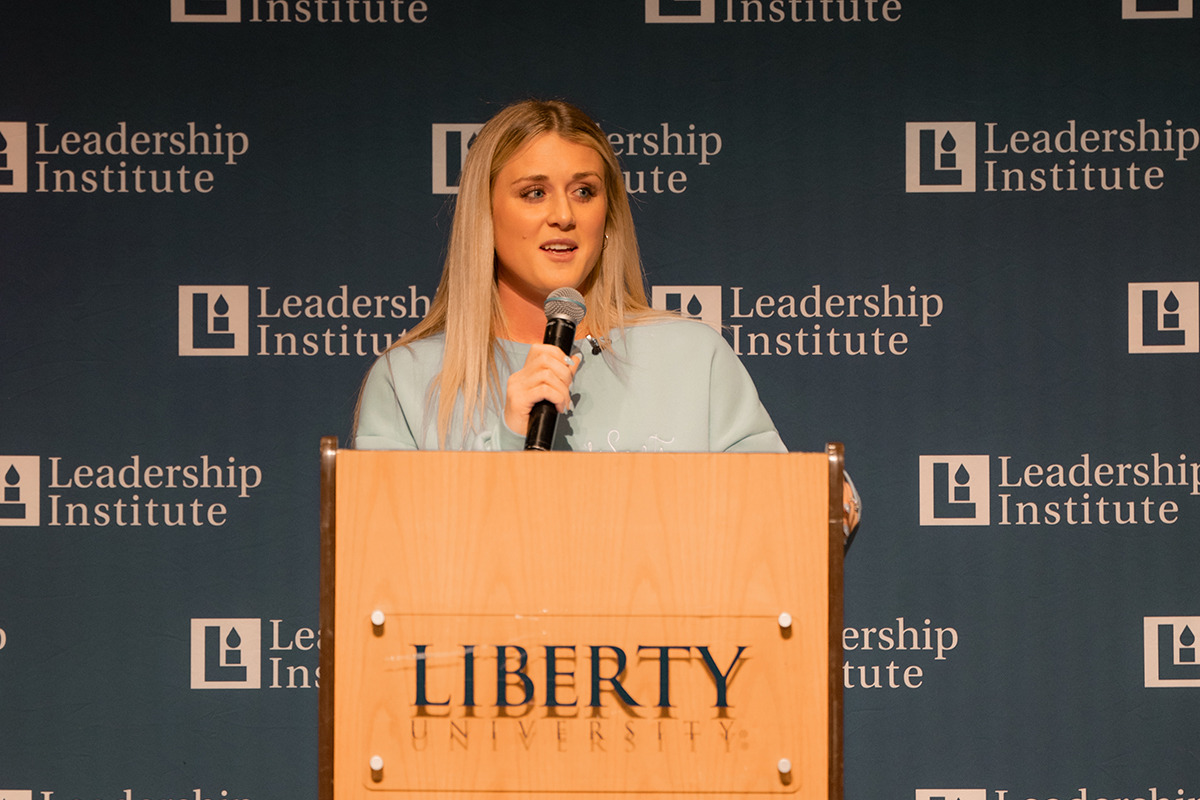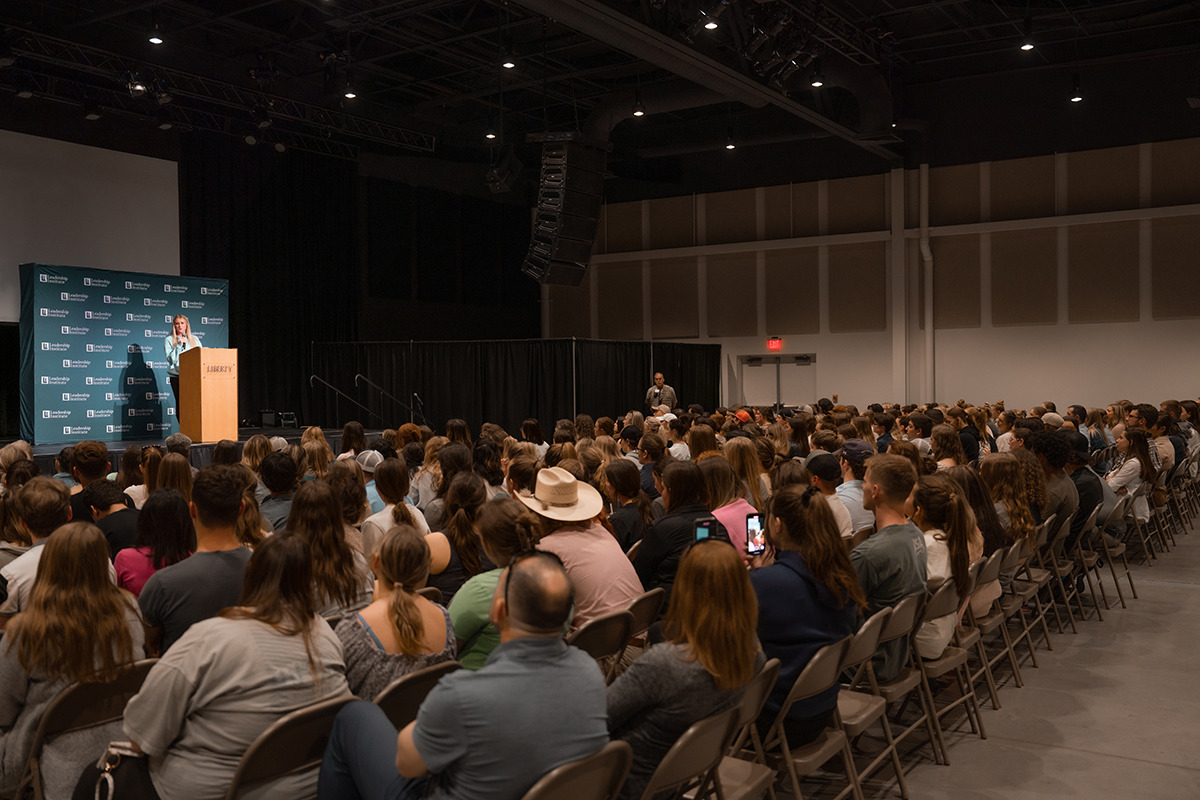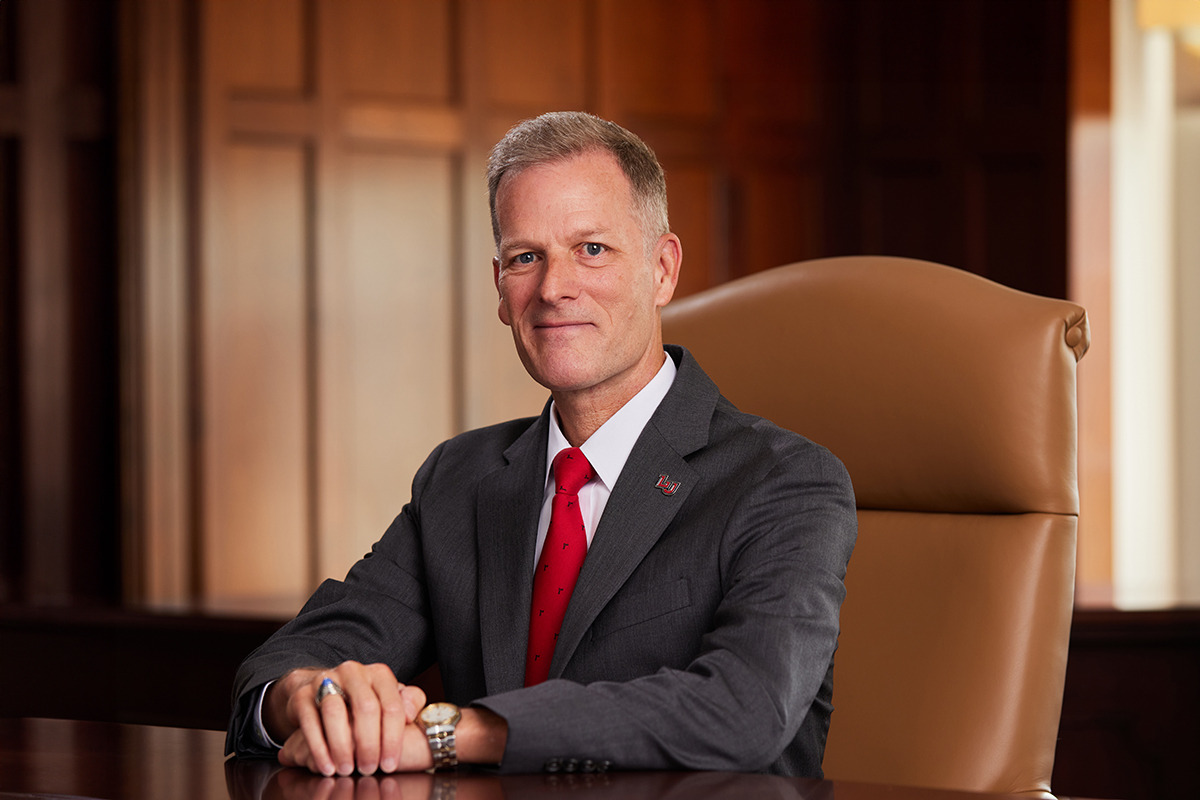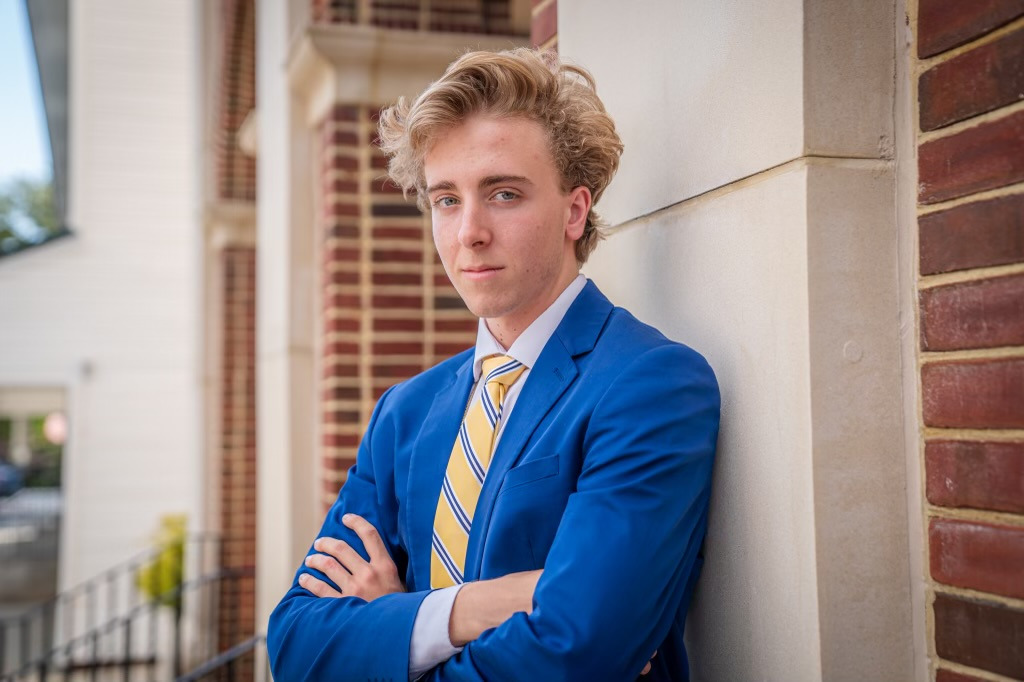Search News Archives
Filter News Articles
Additional Navigation
Former NCAA swimmer speaks on defending women’s sports amidst cultural confusion
April 14, 2023 : By Christian Shields - Office of Communications & Public Engagement

Liberty University’s Life, Liberty and the Pursuit of Truth club, in partnership with the Leadership Institute, welcomed former NCAA student-athlete Riley Gaines to campus on Tuesday to speak about the issue of transgender athletes competing in female sports.
Gaines, who graduated in 2022 from the University of Kentucky, originally made headlines in 2022 for speaking out against the NCAA’s decision to allow Lia Thomas, a biological male, to compete in the 2022 Women’s Swimming National Championships. She has since spent the last year speaking at various events and working with legislators to block biological male athletes from competing in female-exclusive sports events.
Gaines opened by expressing her appreciation at receiving a warm welcome from the Liberty crowd, noting that she had been physically assaulted and harassed when she attempted to speak at San Francisco State University last week.
Gaines, , said that she previously planned on attending dental school after college but decided to delay continuing her education to instead focus on protecting female athletes.
“I decided to put off dental school for a year because dental school will always be there, but the relevance and the importance behind what I am talking to you guys about and what I know is at stake won’t always be there,” she said.
During her time at Kentucky, Gaines experienced a stellar career during which Kentucky won the 2021 SEC Swimming and Diving Championships, with Gaines, then a junior, taking first in the 200-yard freestyle. She went on to place seventh in the 200-yard freestyle at nationals.
Things began to change her senior year when she first heard about Thomas. Gaines recalled originally thinking something seemed wrong when she heard Thomas was dominating at several different distances, ranging from 100 yards to the mile. She thought it was also odd that Thomas attended the University of Pennsylvania, a school not known for its swimming prowess.
These questions were answered when it was announced that Thomas had previously spent three years competing on the men’s team before transitioning to a woman. Gaines said at that point, the news did not worry her because she trusted that the NCAA would properly handle the issue.
“I thought the NCAA would see this exactly how I saw it, exactly how my teammates saw it, exactly how any sane person would see this,” she said. “But that was not how the NCAA saw it. They saw absolutely nothing wrong with it.”
This situation became personal when Gaines attended the 2023 Nationals and watched Thomas compete. She witnessed a fellow competitor finish 17th in race that Thomas dominated, narrowly missing the chance to be an All-American and to compete in the consolation race.
“(The swimmer) looks at me. I knew who she was, but I didn’t know her that well. But she looks at me and she grabs me, tears just start rolling down her face and she says, ‘I just got beat by someone that didn’t even have to try,’” Gaines said. “And that’s when my feelings shifted because up until this point, I was just kind of mad and frustrated by the whole thing, but when she looked at me and said that and I saw how distraught she was, that’s when my feelings changed to heartbreak. I felt like I had just been punched in the gut.”
Later, Gaines competed against Thomas in the 200-yard freestyle event, where the two tied with a time of 1:43.40. Despite the tie, Thomas alone received the trophy.
“I knew up until this point that everything that happened was wrong — the competition, the locker room — but when this official reduced everything that I and all the girls at that meet had worked our entire lives for down to a photo op to validate the feelings and identity of a male, that’s what really pushed me over the edge,” Gaines said.
 Gaines also spoke about how Thomas’ presence in the locker rooms made her and the other student-athletes uncomfortable, arguing that she should not be forced to share a changing area with a biological male.
Gaines also spoke about how Thomas’ presence in the locker rooms made her and the other student-athletes uncomfortable, arguing that she should not be forced to share a changing area with a biological male.
Gaines mentioned that another transgender athlete competed at the event, only this time it was a biological female who identified as a male and competed as a female. She argued that she did not see an issue with this athlete competing because the gender reassignment did not provide that athlete with an unfair advantage.
“I don’t want to control what someone does in their free time, but I do have a problem when you start infringing on our rights, privacy, and safety,” she said.
Since graduation, Gaines has spent her time at various college campuses as well as working to change legislation to better protect female athletes. She has also reached out to different news outlets from both sides of the political aisle to share her story, with some media outlets accepting her requests and others rejecting her on the premise of not wanted to spread transphobic hate.
“I welcome protests. I welcome opposing questions as long as it’s a dialogue that’s civil and we’re willing to listen to each other,” Gaines said.
After being nominated for NCAA Woman of the Year, Gaines decided to use her platform for good. Working with the Independent Women’s Forum, she purchased a booth at the event to champion for women’s sports. In addition, she delivered a petition with 1,100 signatures to the NCAA, calling for the organization to stop discriminating against female athletes on the basis of sex.
Despite receiving support from collegiate coaches at the event, Gaines said that she was discouraged by the lack of ultimate change.
“For the first 60 (coaches) or so, I was like ‘Wow, this is awesome. They agree with us.’ But then after those first 60, it was discouraging,” she said, noting that the coaches refused to publicly support her. “If we’re all on the same page, why are we catering to the minority then? If we’re all in agreeance, then what’s the problem. These are the people who have the power to make changes, yet they’re not.”
Gaines concluded by noting that her experience is shared by female athletes across the country, but those athletes often face major repercussions if they speak out. She added that this problem extends outside of the realm of sports, with some prisons even allowing biological males to live with female inmates.
“Really, it is spiritual warfare. It’s no longer a battle of right versus wrong or good versus bad; this is moral versus evil,” she said, noting that the issue stems from Marxism and a radical attempt to destroy traditional values. “The Bible tells us this is all going to happen. There are prophecies, and we know we’re going to win. We will be on the right side of this, but it’s a matter of how long before sanity is restored because it feels as if now there’s a lot of what’s going on with the changing of the language we’re using and the denying truth and the suppressing speech.”


